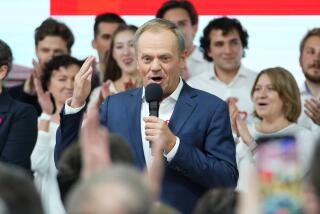Poland Chief Asks Party to OK Solidarity
- Share via
WARSAW — Premier Mieczyslaw F. Rakowski urged the Communist Party today to legalize the banned Solidarity trade union on condition that it not be a government opponent that would “pull the country into anarchy.”
He indicated, however, that Solidarity would be asked to forgo strikes during a two-year trial period after it is legalized and to give up any financial assistance it receives from the West.
During the proposed trial period both sides would gather “positive and negative experiences,” leading to permanent legalization, Rakowski said, according to a TV broadcast of his speech to a heated meeting of the party’s 230-member Central Committee.
The trial period would last until May 3, 1991--the 200th anniversary of the adoption of a short-lived but still admired progressive constitution in Poland that was overthrown by imperial Russia.
“We have to gain certainty that this Solidarity, which cannot be a simple repetition of the old one, does not pull the country into anarchy,” he said.
News Blackout Imposed
After Rakowski’s remarks were broadcast, a news blackout on coverage of the plenum went into effect, indicating the meeting had entered its decision-making phase.
Party Secretary Leszek Miller has told state TV there was a “full-blooded” verbal duel between Rakowski and official unions chief Alfred Miodowicz in the closed session. Both Rakowski and Miodowicz are members of the ruling Politburo.
“It was very hot,” Miller told a TV interviewer.
The discussion marked a key moment for the party and Solidarity, as communist leaders struggled to decide whether to risk repeating the experiment of 1980 that permitted the East Bloc’s first legal, independent union.
Rakowski addressed specific questions to Solidarity, saying the answers would determine if the union could be seen as a partner, thereby “opening the process of legalization,” or as a “political opponent with whom one has to carry constant political struggle.”
The questions included whether the union would “see itself as an integral part of socialism” and whether it intends to act as a trade union or as a political movement or party.
He also asked what position Solidarity would have toward such anti-communist Polish groups as the Confederation for an Independent Poland, and whether it would be a “foreign agent” by continuing to accept money from the U.S. Congress and other foreign organizations.
“I am putting all these problems in an unambiguous way because I aim at avoiding any kind of ambiguity. The problems are too serious to allow ambiguities,” Rakowski said.
More to Read
Sign up for Essential California
The most important California stories and recommendations in your inbox every morning.
You may occasionally receive promotional content from the Los Angeles Times.













